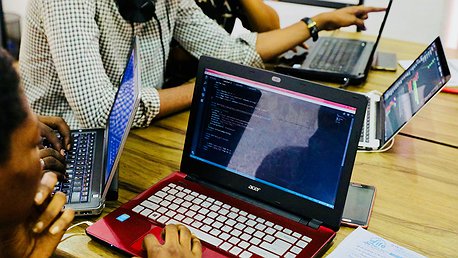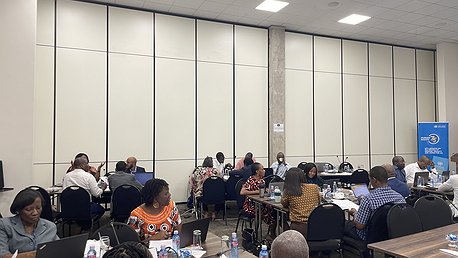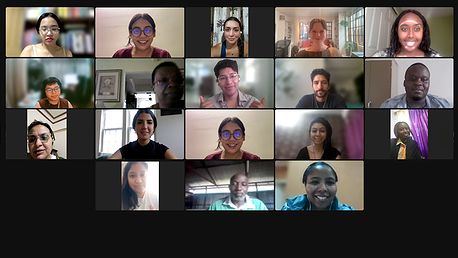June 13 update: The deadline for applications for the 2024 Learning Lab has now closed. Our team will be in touch with selected applicants in the next weeks. Thank you to everyone who applied!
This page is also available in Spanish and Arabic.
The knowledge and skills to engage critically with public debates shouldn’t be the exclusive domain of technical experts. The Learning Lab will bring together a cohort of people who work with communities across the Global South to explore how to “connect the dots” between particular experiences of discrimination; policy decisions; and broader economic trends. We’ll do a deep dive into Decoding Injustice, a research approach that helps reveal how the design of our economies harms people’s rights by organizing methods for collecting, analyzing, and presenting data around three steps: Interrogate, Illuminate, and Inspire.
The Lab will take place over a four-month period between June and September 2024, and will involve a series of interactive online workshops and time in between for participants to apply what they’ve learned to their work—with support from the lab facilitators and the cohort through informal exchanges. To apply, please complete the application form by June 12, 2024.
Who we're looking for
We aim to bring together a cohort of participants that represent diverse lived experiences and perspectives from across the Global South. We believe you would benefit from taking part in the Learning Lab if you:
-
are part of an organization, community group, network, or coalition fighting for human rights, economic, social, or environmental justice;
-
work with communities facing discrimination, including women, Indigenous Peoples, Afro-descendants, people with disabilities, LGBTIQ+ groups, or with other intersecting identities that lead to economic marginalization;
-
collect data or information, conduct research, or build evidence through other ways about injustices facing your community to support advocacy, campaigning, or organizing;
-
have questions about how economic policies affect life in your community;
-
are excited to explore new approaches and learning that you could incorporate into your work.
As we pilot the Lab with this second group, we are particularly keen to work with participants who are committed to the values of participatory learning and can help us learn as we go, by being generous with their feedback.
What it means to participate
The Lab will take place online between June and September, 2024 . It’s likely to involve 25-30 hours in total. We’ve designed the Lab with more intensive bursts of facilitated learning and time in between for participants to apply it to their work—with support from the lab facilitators and the cohort. We will also facilitate informal exchanges that encourage collective reflection on shared challenges.
Our welcome call will happen on Monday, June 24, 2024.
Key components of the Lab include:
-
Interactive online workshops: Every month, we’ll host a two-day, three hours per day, workshop on Zoom where we’ll focus on one of the steps of Decoding Injustice: Interrogate, Illuminate, and Inspire. Over two half-day sessions, we’ll introduce the methods that underpin that step and explore how they might be used in different contexts.
-
Reflective exercises: In between workshops, members of the cohort are encouraged to experiment with, and reflect on, different ways of applying Decoding Injustice in their work.
-
Informal exchanges: Every three weeks, we’ll host a one-hour Zoom call, where the cohort can gather more informally to exchange experiences, ask each other questions, and explore shared interests.
-
One-to-one coaching: Throughout the Lab, cohort members are encouraged to schedule calls with the CESR team to dig deeper into an area of learning, or unpack a challenge they face in their everyday work and brainstorm creative solutions.
The course is free of charge. The Lab will be fully virtual, so you’ll need access to a computer and a fast enough internet connection to support Zoom and Google Docs. Participants who face limitations to participating and may need logistical support please flag that in the application form. We will do our best to provide support. The Lab will be multilingual, with Arabic, English, and Spanish interpretation available.
Benefits of joining the Cohort
Joining the Lab will be an opportunity to connect with and learn from a diverse group of people grappling with similar issues, but from different angles. Together, we’ll explore how applying a Decoding Injustice approach can “connect the dots” between particular groups facing discrimination; specific policy decisions; and broader economic trends.
Participants will strengthen their abilities to:
-
Organize methods for collecting, analyzing, and presenting data (e.g. from official sources, community scorecards, budget analysis) in a creative new way by applying the Decoding Injustice approach in their work.
-
Think more critically about the strategic questions to consider in conducting “evidence-based” advocacy (e.g. how to identify the power structures that uphold the status quo, and how to decide on the right level of technical detail to include).
-
Continue building connections and relationships with other global allies doing similar work (e.g. sharing successes, challenges, and learning with each other).
What we'll cover
The key question we’ll explore together is how to develop knowledge and skills to engage critically with public debates about economic policy in a liberating and transformative way, not tokenistic and extractive. To do that, we’ll:
-
Dig into different understandings and interpretations of concepts related to human rights and the economy, so we can develop inclusive language that will resonate with different communities.
-
Do a deep dive into the methods that underpin Decoding Injustice and related approaches, such as participatory action research. These include problem mapping; identifying indicators and benchmarks; collecting, analyzing, and visualizing data; and action planning.
-
Experiment with different ways of supporting communities to “get their head around” these methods to make them “their own”.
-
Identify aspects of Decoding Injustice that need further exploration.
How to apply
If you want to join the Learning Lab, please complete the application form by June 12. The questions in the form ask you to reflect on what interests you about the Lab, whether you can commit to participating actively, and whether there are any barriers to your participation that some support could help alleviate.
Would you like to speak with our team to answer any specific questions you may have? Please email us at learninglab@cesr.org. We're looking forward to hearing from you!



